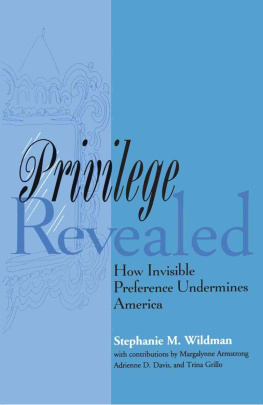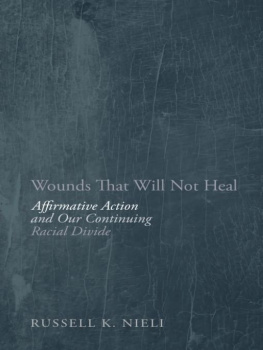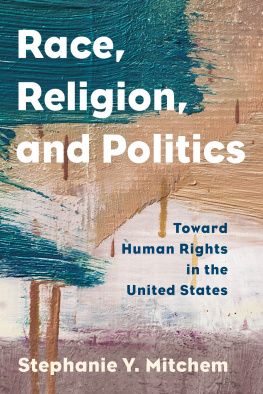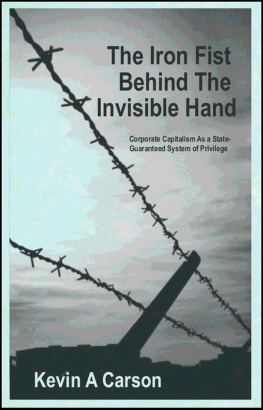Stephanie M. Wildman - Privilege Revealed: How Invisible Preference Undermines America
Here you can read online Stephanie M. Wildman - Privilege Revealed: How Invisible Preference Undermines America full text of the book (entire story) in english for free. Download pdf and epub, get meaning, cover and reviews about this ebook. City: New York, USA., United States, year: 1996, publisher: New York University Press, genre: Politics. Description of the work, (preface) as well as reviews are available. Best literature library LitArk.com created for fans of good reading and offers a wide selection of genres:
Romance novel
Science fiction
Adventure
Detective
Science
History
Home and family
Prose
Art
Politics
Computer
Non-fiction
Religion
Business
Children
Humor
Choose a favorite category and find really read worthwhile books. Enjoy immersion in the world of imagination, feel the emotions of the characters or learn something new for yourself, make an fascinating discovery.
- Book:Privilege Revealed: How Invisible Preference Undermines America
- Author:
- Publisher:New York University Press
- Genre:
- Year:1996
- City:New York, USA., United States
- Rating:4 / 5
- Favourites:Add to favourites
- Your mark:
- 80
- 1
- 2
- 3
- 4
- 5
Privilege Revealed: How Invisible Preference Undermines America: summary, description and annotation
We offer to read an annotation, description, summary or preface (depends on what the author of the book "Privilege Revealed: How Invisible Preference Undermines America" wrote himself). If you haven't found the necessary information about the book — write in the comments, we will try to find it.
Privilege Revealed: How Invisible Preference Undermines America — read online for free the complete book (whole text) full work
Below is the text of the book, divided by pages. System saving the place of the last page read, allows you to conveniently read the book "Privilege Revealed: How Invisible Preference Undermines America" online for free, without having to search again every time where you left off. Put a bookmark, and you can go to the page where you finished reading at any time.
Font size:
Interval:
Bookmark:
Thank you for buying this ebook, published by NYU Press.
Sign up for our e-newsletters to receive information about forthcoming books, special discounts, and more!
Sign Up!
A publisher of original scholarship since its founding in 1916, New York University Press Produces more than 100 new books each year, with a backlist of 3,000 titles in print. Working across the humanities and social sciences, NYU Press has award-winning lists in sociology, law, cultural and American studies, religion, American history, anthropology, politics, criminology, media and communication, literary studies, and psychology.
Privilege Revealed
Critical America
General Editors: RICHARD DELGADO and JEAN STEFANCIC
White by Law:
The Legal Construction of Race
Ian F. Haney Lopez
Cultivating Intelligence:
Power, Law, and the Politics of Teaching
Louise Harmon and Deborah W. Post
Privilege Revealed:
How Invisible Preference Undermines America
Stephanie M. Wildman
with contributions by Margalynne Armstrong,
Adrienne D. Davis, and Trina Grillo
How Invisible Preference Undermines America
Stephanie M. Wildman
with contributions by
Margal ynne Armstrong,
Adrienne D. Davis, and Trina Grillo

NEW YORK UNIVERSITY PRESS
New York and London
Copyright 1996 by New York University
All rights reserved
Library of Congress Cataloging-in-Publication Data
Wildman, Stephanie M., 1949
Privilege revealed: how invisible preference undermines America
Stephanie M. Wildman with Margalynne Armstrong [et al.].
p. cm. (Critical America)
Includes bibliographical references and index.
Contents: Making systems of privilege visiblePrivilege in the workplacePrivilege in residential housingPrivilege and the mediaObscuring the importance of raceComparisons between racism and sexism (or other -isms)The dream of diversity and the cycle of exclusionThe quest for justiceTeaching and learning toward transformationConcluding thoughts on noticing privilege.
1. Power (Social sciences)United States. 2. EqualityUnited States. I. Title. II. Series.
HN90.P6W56 1996
303.3dc20 96-4483
CIP
Koosh ball is a registered trademark of Oddzon Products, Inc., Campbell, CA.
Wite-Out is a registered trademark of Wite-Out Products, Inc., Beltsville, MD.
New York University Press books are printed on acid-free paper, and their binding materials are chosen for strength and durability.
Manufactured in the United States of America
10 9 8 7 6 5 4 3 2
For
Becky Wildman-Tobriner
Ben Wildman-Tobriner
Luisa Grillo-Chope
Jeffrey Grillo
Rebecca Buckner Pierce
and the future of all the children.
In memory of Lena Sokol
Stephanie M. Wildman
Stephanie M. Wildman
Stephanie M. Wildman with Adrienne D. Davis
Stephanie M. Wildman
Margalynne Armstrong
Adrienne D. Davis and Stephanie M. Wildman
Trina Grillo and Stephanie M. Wildman
Stephanie M. Wildman
Stephanie M. Wildman
Stephanie M. Wildman
Stephanie M. Wildman and Margalynne Armstrong
Thank you first and foremost to Richard Delgado and Jean Stefancic, series editors of Critical America, without whose support this book would not have come to exist. I am grateful to the community of scholars involved in critical race theory, critical legal studies, and feminist critical theory, whose work has created a community that makes the expression of these ideas possible. Thanks also to my students and faculty colleagues at Santa Clara Law School, Hastings College of the Law, Stanford Law School, and the University of San Francisco School of Law, where I have taught about these issues.
I would like to recognize my intellectual debt to two colleagues, Adrienne Davis and Trina Grillo, both professors of law and both women of color. The three of us worked together for almost two years, writing several working papers examining systems of privilege. I know that I am able to see more now, because of my friendship with them. More recently, I have benefited greatly from time spent with Margalynne Armstrong, another African American law professor.
I also owe particular thanks to Trina, Adrienne, and Margalynne, along with Edith Wildman, Herman Wildman, Emily Goldman, Dr. Russell Leong, Carole Shauffer, and Catharine Wells, for patiently reading drafts of this manuscript. Gloria Gonzlez and the support staff at Santa Clara Law School have my appreciation for superlative assistance in preparing the manuscript. As always, Lee Ryan and Marian Shostrom provided professional and caring research support. NYU Press made the final stages a writers dream.
Finally, thanks and love to Michael Tobriner, Becky Wildman-Tobriner, and Ben Wildman-Tobriner, because it is not always easy to live with someone who is writing a book.
STEPHANIE M. WILDMAN
Many contemporary theorists have emphasized the social construction of race. The idea of race exists because people give it particular meaning, a meaning that changes with time, place, and circumstances. But one constant remainsthe privileging of whiteness through different devices, social patterns, and even laws. This racial positioning is maintained in part through an unwritten rule that it cannot be discussed. In fact, the corollary rulemandates that we talk about the societal desire for equality while avoiding an examination of white racial privilege or any other privilege.
This book describes how white privilege reinforces the existing racial status quo and overlaps and interacts with other systems of privilege, including those based on gender, sexual orientation, economic wealth, physical ability, and religion. Just as the systems themselves are made invisible by our language, the interaction between the systems is also masked. People of color, women, gays, and lesbians are words frequently used to name people who face discrimination. The phrasing suggests that people of color are male, that women are white, and that gays and lesbians have no race, but of course these terms are not mutually exclusive.
Our language, and how we read it, reflects the dominant cultural privileging of whiteness, maleness, and heterosexuality. We cannot combat these default assumptions without identifying race, sex, and sexual orientation more often than we are accustomed to doing. After all, the unwritten rule tells us not to talk about it.
Difficulties also arise with respect to words to describe race, such as white and Black. The Chicago Manual of Style uses lowercase letters for the word Black, and it appears that way in many quotations. Many legal scholars have disagreed with that convention, capitalizing Black to show that, as Kimberl W. Crenshaw explains, Blacks, like Asians, [and] Latinos constitute a specific cultural group and, (thus) require denotation as a proper noun. Neil Gotanda agrees that Black should be capitalized because it has deep political and social meaning as a liberating term.
Ian Haney Lpez makes a strong argument for also capitalizing the word white in his book White by Law: The Legal Construction of Race. Nonetheless, because whites usually see ourselves in uppercase letters without even realizing it, because of white privilege, I have declined to capitalize white in this text.
Next pageFont size:
Interval:
Bookmark:
Similar books «Privilege Revealed: How Invisible Preference Undermines America»
Look at similar books to Privilege Revealed: How Invisible Preference Undermines America. We have selected literature similar in name and meaning in the hope of providing readers with more options to find new, interesting, not yet read works.
Discussion, reviews of the book Privilege Revealed: How Invisible Preference Undermines America and just readers' own opinions. Leave your comments, write what you think about the work, its meaning or the main characters. Specify what exactly you liked and what you didn't like, and why you think so.









